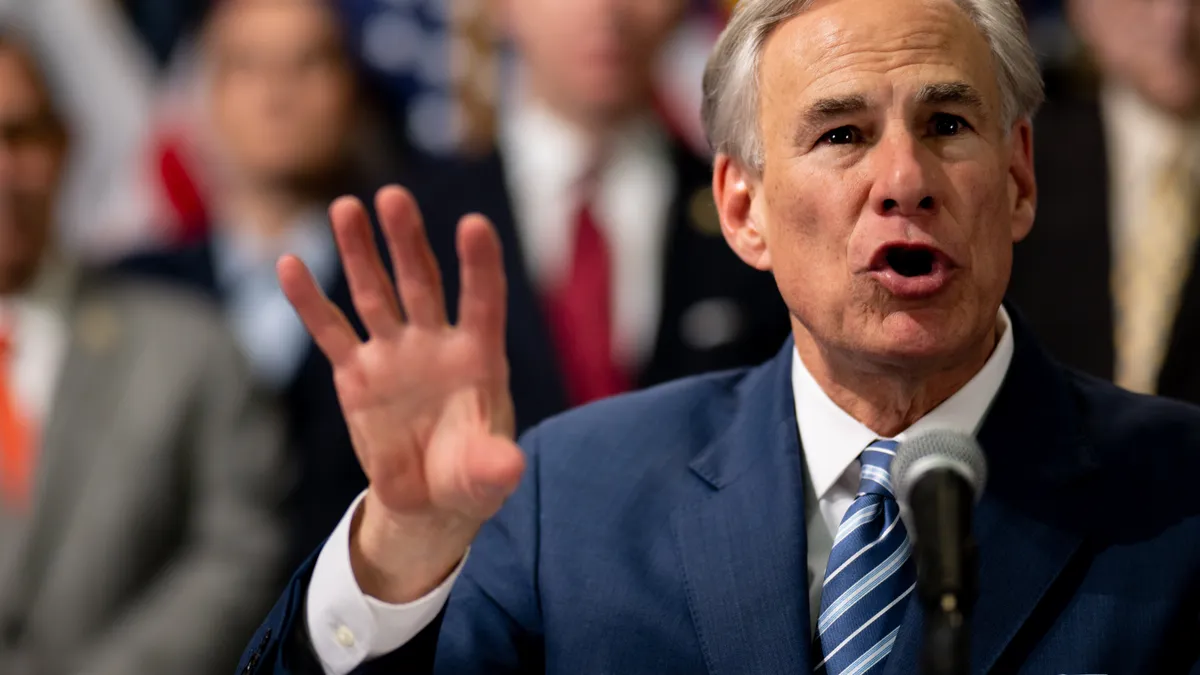Dive Brief:
-
Texas school boards had until Feb. 29 to vote on whether they want to bring religious chaplains into their schools to provide mental health support, as authorized under a law that took effect in September. The measure, SB 763, required boards to reach a decision within six months of the effective date.
-
Under the law, public school districts and charter schools can employ a chaplain or accept one as a volunteer “to provide support, services, and programs for students,” as long as the chaplain is not a known sex offender. However, civil rights groups have warned that this could lead to certain religions being given preference and to religious coercion of students.
-
Since Texas passed the law last June, similar proposals have been considered in at least 13 other state legislatures, according to Interfaith Alliance, an organization advocating for religious freedom and democracy, and other groups. These states include Alabama, Florida, Georgia, Iowa, Indiana, Kansas, Maryland, Missouri, Mississippi, Nebraska, Ohio, Oklahoma and Utah.
Dive Insight:
Multiple religious and civil rights groups pushed back against the law Thursday, the deadline for school boards to vote on whether they'd like to hire a chaplain. Those groups, including the Interfaith Alliance and Anti-Defamation League, said a large number of Texas school districts have already decided against creating school chaplain programs.
Houston Independent School District, the state's largest school system, voted in January to reject chaplains. Other districts, however, have decided to accept the offer.
Texas' law is part of a broader national debate on religion in public schools that mounted after the U.S. Supreme Court released a series of decisions that public school advocates say have blurred the line between church and state.
Two cases — Carson v. Makin and Espinoza v. Montana Department of Revenue — gave private institutions access to public funding regardless of the money's use or the school's religious affiliation.
Another, Kennedy v. Bremerton School District, found that a Washington state school district violated a high school football coach's First Amendment rights when it fired him for praying on the 50-yard line, sometimes with students, after his team’s games.
That case specifically prompted the U.S. Education Department to update its guidance last May on religious expression and prayer in public schools. That guidance said, in part, that:
- Teachers, administrators and other employees are not to encourage or discourage private prayer or other religious activity.
- While employees can engage in private religious expression or observance before school or during breaks, they cannot “compel, coerce, persuade, or encourage students to join in the employee’s prayer or other religious activity."
- Schools "may take reasonable measures to ensure that students are not pressured or encouraged to join in the private prayer of their teachers or coaches.”
However, the Supreme Court’s rulings and the department's guidance have left gray areas, prompting state policymakers to fill in the gaps in ways that sometimes concern public school advocates.
Oklahoma, for example, established the nation's first religious public charter school, which is scheduled to launch for the 2024-25 school year. Parents and State Attorney General Gentner Drummond have already filed lawsuits challenging the school’s constitutionality. The Oklahoma Supreme Court is expected to hear oral arguments on the challenge in April.
The Texas law allowing religious chaplains has garnered similar pushback, although the degree to which school boards will take the state up on the offer is yet to be determined.
Civil rights organizations including the American Civil Liberties Union sent the state's school boards a letter last June after Gov. Greg Abbott signed SB 763 into law, warning them to steer clear of hiring chaplains, as they would risk violating the Constitution.
In September, chaplains located in various school districts — as well as some working for higher education institutions — also wrote to all Texas public school board members saying that the law does not require any kind of training or qualifications for prospective public school chaplains. Even with formal training, they said, chaplains "are not qualified for the duties envisioned by SB 763."
"We cooperate with mental health counselors — we do not compete with them," they said. The chaplains added that the funding mechanism, which will use public school safety dollars to pay chaplains, is "wholly inappropriate."












